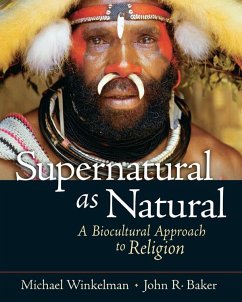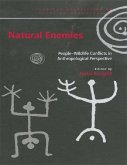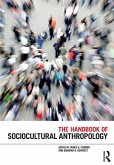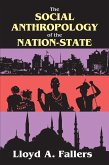Supernatural as Natural (eBook, PDF)
A Biocultural Approach to Religion


Alle Infos zum eBook verschenken

Supernatural as Natural (eBook, PDF)
A Biocultural Approach to Religion
- Format: PDF
- Merkliste
- Auf die Merkliste
- Bewerten Bewerten
- Teilen
- Produkt teilen
- Produkterinnerung
- Produkterinnerung

Hier können Sie sich einloggen

Bitte loggen Sie sich zunächst in Ihr Kundenkonto ein oder registrieren Sie sich bei bücher.de, um das eBook-Abo tolino select nutzen zu können.
This book provides a general introduction to the biological and evolutionary bases of religion and is suitable for introductory level courses in the anthropology and psychology of religion and comparative religion.
Why did human ancestors everywhere adopt religious beliefs and customs? The presence and persistence of many religious features across the globe and time suggests that it is natural for humans to believe in the supernatural. In this new text, the authors explore both the biological and cultural dimensions of religion and the evolutionary origins of religious features.
- Geräte: PC
- mit Kopierschutz
- eBook Hilfe
- Größe: 6.23MB
![Ritual, Performance and the Senses (eBook, PDF) Ritual, Performance and the Senses (eBook, PDF)]() Ritual, Performance and the Senses (eBook, PDF)41,95 €
Ritual, Performance and the Senses (eBook, PDF)41,95 €![Supernatural and Natural Selection (eBook, PDF) Supernatural and Natural Selection (eBook, PDF)]() Lyle B. SteadmanSupernatural and Natural Selection (eBook, PDF)60,95 €
Lyle B. SteadmanSupernatural and Natural Selection (eBook, PDF)60,95 €![Syncretic Shrines and Pilgrimages (eBook, PDF) Syncretic Shrines and Pilgrimages (eBook, PDF)]() Karan SinghSyncretic Shrines and Pilgrimages (eBook, PDF)41,95 €
Karan SinghSyncretic Shrines and Pilgrimages (eBook, PDF)41,95 €![Natural Enemies (eBook, PDF) Natural Enemies (eBook, PDF)]() Natural Enemies (eBook, PDF)45,95 €
Natural Enemies (eBook, PDF)45,95 €![The Handbook of Sociocultural Anthropology (eBook, PDF) The Handbook of Sociocultural Anthropology (eBook, PDF)]() The Handbook of Sociocultural Anthropology (eBook, PDF)41,95 €
The Handbook of Sociocultural Anthropology (eBook, PDF)41,95 €![The Social Anthropology of the Nation-State (eBook, PDF) The Social Anthropology of the Nation-State (eBook, PDF)]() Lloyd FallersThe Social Anthropology of the Nation-State (eBook, PDF)45,95 €
Lloyd FallersThe Social Anthropology of the Nation-State (eBook, PDF)45,95 €![Inside the New China (eBook, PDF) Inside the New China (eBook, PDF)]() Gene AyresInside the New China (eBook, PDF)45,95 €
Gene AyresInside the New China (eBook, PDF)45,95 €-
-
-
Why did human ancestors everywhere adopt religious beliefs and customs? The presence and persistence of many religious features across the globe and time suggests that it is natural for humans to believe in the supernatural. In this new text, the authors explore both the biological and cultural dimensions of religion and the evolutionary origins of religious features.
Dieser Download kann aus rechtlichen Gründen nur mit Rechnungsadresse in A, B, BG, CY, CZ, D, DK, EW, E, FIN, F, GR, HR, H, IRL, I, LT, L, LR, M, NL, PL, P, R, S, SLO, SK ausgeliefert werden.
- Produktdetails
- Verlag: Taylor & Francis
- Seitenzahl: 384
- Erscheinungstermin: 4. September 2015
- Englisch
- ISBN-13: 9781317343738
- Artikelnr.: 43828161
- Verlag: Taylor & Francis
- Seitenzahl: 384
- Erscheinungstermin: 4. September 2015
- Englisch
- ISBN-13: 9781317343738
- Artikelnr.: 43828161
- Herstellerkennzeichnung Die Herstellerinformationen sind derzeit nicht verfügbar.
Religion's Family Resemblances
Religion, Spirituality, and Religiosity
Overview of Book
Chapter 1: Anthropology and the Study of Religion
Introduction to the Anthropological Study of Religion
Western Perspectives on Religion
The Development of Anthropological Approaches to Religion
The Four-Field Approach of Anthropology
Conclusion: The Biocultural Approach to the Study of Religiosity
Chapter 2: Our World and How We Know It
Introduction
Science, Religion, and the Universe
Mysticism as Science
Conclusions: Comparing Science and Religion
Chapter 3: Consciousness and Spiritual Experiences
Opening vignette: Visionary Spiritual Experiences and the Origins of Major
Religious Traditions
Introduction
What is Consciousness?
The Biological Bases of Spiritual Consciousness: The Integrative Mode of
Consciousness
Origins of Religious Experiences: Natural Induction of the Integrative Mode
of Consciousness
Adaptive Aspects of the Integrative Mode of Consciousness
Conclusion: Religious Experience as Personal Experience of Biology
Appendix: Assessing Mystical Experiences/Hood's Mysticism Scale
Chapter 4: Animal Rituals and the Roots of Religiosity
Introduction: Ritual in the Animal World
What are Rituals?
The Triune Brain and Ritual Behavior
Animal Rituals
The Evolution of Ritual Behaviors
Conclusions: The Animal Roots of Human Ritual Activity
Chapter 5: The Origins of Shamanism and the Flowering of Religiosity
Introduction: Evidence for the Emergence of New Forms of Ritual
What are Shamans?
The Evolutionary Origins of Spiritual Experiences
Psilocybin-Containing Mushrooms as Sources of Spiritual Experiences
The Middle/Upper Paleolithic Transition and Human Cultural Evolution
Human Cognitive Evolution: The Emergence of Specialized Intelligences
"Complex Hunter-Gatherer Type Religions": The Rise of Ancestor Cults and
Priests
Conclusions
Chapter 6: Origins and Functions of Religious Healing
Introduction: Religious Healing as a Cultural Universal
The Co-Evolution of Healing and Religiosity
Shamanism as a Foundation for Religious Healing Adaptations
Religious Adaptations in Healing Processes
Conclusions: Shamanic Healing and the Holistic Imperative
Chapter 7: Religion and Cognition: How Religion Shapes How We Think
Introduction: Religious Ideas and the Structure of the Universe
Animism: The Belief in Spirit Beings
Myth and the Universe
Substantive Beliefs
Conclusions: Spirit Concepts as Indigenous Psychologies
Chapter 8: Religion and Emotions
Introduction
Bronislav Malinowski: The Emotional Adaptiveness of Magic and Religion
Sigmund Freud and the Roles of the Unconscious in Religion
Religion, Sex, and Gender
How Religion Shapes Our Development
Religion as an Evolutionary Byproduct? Attachment Theory and Religion
Religious Conversion as Learning a Second Culture
Conclusions
Chapter 9: Religion and Society: How Religion Shapes Our Relations with
Others
Introduction
The Evolutionary Origins of Human Social Organization and Religion
Durkheim and the Social Symbolic Approaches to Religion
Religion and Social Control
The Social Origins of Conceptualizations of Deity and the Sacred
Religion as a Biologically-Based Adaptive Social Mechanism
Conclusions: Durkheim's Legacy in Understanding Religion as a Social and
Symbolic Phenomenon
Chapter 10: Supernatural Evil
Introduction: Supernatural Evil as a Religious Universal
Anthropological Views of Sorcery and Witchcraft
The Sorcerer/Witch as a Social Universal of Religion
and Shamanism
Witchcraft and Heresy in Europe
Human Sacrifice
Conclusions
Chapter 11: Conclusions: Religion in Evolutionary Perspective
Introduction
The Conceptual Frameworks of Evolution
Assessing the Evolutionary Status of Religious Features
Why Must we Learn to Disagree?
Conclusions: Universalist Perspectives
References
Index
Religion's Family Resemblances
Religion, Spirituality, and Religiosity
Overview of Book
Chapter 1: Anthropology and the Study of Religion
Introduction to the Anthropological Study of Religion
Western Perspectives on Religion
The Development of Anthropological Approaches to Religion
The Four-Field Approach of Anthropology
Conclusion: The Biocultural Approach to the Study of Religiosity
Chapter 2: Our World and How We Know It
Introduction
Science, Religion, and the Universe
Mysticism as Science
Conclusions: Comparing Science and Religion
Chapter 3: Consciousness and Spiritual Experiences
Opening vignette: Visionary Spiritual Experiences and the Origins of Major
Religious Traditions
Introduction
What is Consciousness?
The Biological Bases of Spiritual Consciousness: The Integrative Mode of
Consciousness
Origins of Religious Experiences: Natural Induction of the Integrative Mode
of Consciousness
Adaptive Aspects of the Integrative Mode of Consciousness
Conclusion: Religious Experience as Personal Experience of Biology
Appendix: Assessing Mystical Experiences/Hood's Mysticism Scale
Chapter 4: Animal Rituals and the Roots of Religiosity
Introduction: Ritual in the Animal World
What are Rituals?
The Triune Brain and Ritual Behavior
Animal Rituals
The Evolution of Ritual Behaviors
Conclusions: The Animal Roots of Human Ritual Activity
Chapter 5: The Origins of Shamanism and the Flowering of Religiosity
Introduction: Evidence for the Emergence of New Forms of Ritual
What are Shamans?
The Evolutionary Origins of Spiritual Experiences
Psilocybin-Containing Mushrooms as Sources of Spiritual Experiences
The Middle/Upper Paleolithic Transition and Human Cultural Evolution
Human Cognitive Evolution: The Emergence of Specialized Intelligences
"Complex Hunter-Gatherer Type Religions": The Rise of Ancestor Cults and
Priests
Conclusions
Chapter 6: Origins and Functions of Religious Healing
Introduction: Religious Healing as a Cultural Universal
The Co-Evolution of Healing and Religiosity
Shamanism as a Foundation for Religious Healing Adaptations
Religious Adaptations in Healing Processes
Conclusions: Shamanic Healing and the Holistic Imperative
Chapter 7: Religion and Cognition: How Religion Shapes How We Think
Introduction: Religious Ideas and the Structure of the Universe
Animism: The Belief in Spirit Beings
Myth and the Universe
Substantive Beliefs
Conclusions: Spirit Concepts as Indigenous Psychologies
Chapter 8: Religion and Emotions
Introduction
Bronislav Malinowski: The Emotional Adaptiveness of Magic and Religion
Sigmund Freud and the Roles of the Unconscious in Religion
Religion, Sex, and Gender
How Religion Shapes Our Development
Religion as an Evolutionary Byproduct? Attachment Theory and Religion
Religious Conversion as Learning a Second Culture
Conclusions
Chapter 9: Religion and Society: How Religion Shapes Our Relations with
Others
Introduction
The Evolutionary Origins of Human Social Organization and Religion
Durkheim and the Social Symbolic Approaches to Religion
Religion and Social Control
The Social Origins of Conceptualizations of Deity and the Sacred
Religion as a Biologically-Based Adaptive Social Mechanism
Conclusions: Durkheim's Legacy in Understanding Religion as a Social and
Symbolic Phenomenon
Chapter 10: Supernatural Evil
Introduction: Supernatural Evil as a Religious Universal
Anthropological Views of Sorcery and Witchcraft
The Sorcerer/Witch as a Social Universal of Religion
and Shamanism
Witchcraft and Heresy in Europe
Human Sacrifice
Conclusions
Chapter 11: Conclusions: Religion in Evolutionary Perspective
Introduction
The Conceptual Frameworks of Evolution
Assessing the Evolutionary Status of Religious Features
Why Must we Learn to Disagree?
Conclusions: Universalist Perspectives
References
Index







